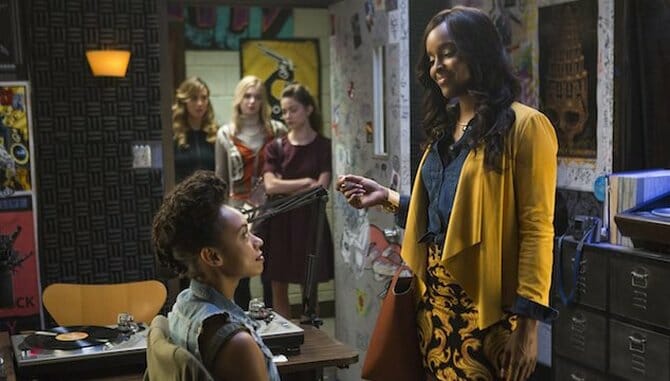Five Reasons to Watch Netflix’s Dear White People
Photo c/o Adam Rose/Netflix
The Netflix original series Dear White People takes its name from creator Justin Simien’s breakout Sundance film. Both the film and the Netflix series delve into the lives of black students at the predominantly white Winchester University, a competitive, fictional Ivy. The show begins in the aftermath of a blackface party thrown by the entirely white (and male) staff of campus humor magazine Pastiche. The party, themed “Dear Black People” not-so-slyly references campus activist Samantha White’s (Logan Browning) campus radio show titled “Dear White People.” Before Pastiche can throw the shindig, the school’s administration rightly shuts it down, but that doesn’t stop Pastiche from putting on it on anyway.
Dear White People uses the crises brought by Winchester’s students’ eagerness to perpetuate black stereotypes to examine the perspectives and back stories of Winchester’s black students. Here are five reasons Dear White People is well worth your watch:
1. The “Rashomon” Structure
The first two episodes of Dear White People might at first feel like you’re watching a shortened version of the film (you are), but hang tight until episode three, where the Netflix series expands upon that story, offering breadth to each of its many characters. The show is told through Rashomon style, examining the same event (the Pastiche party) from several characters’ differing perspectives. The movie primarily focuses on Sam and muckraking student journalist Lionel Higgins’s (DeRon Horton) perspectives, but over the course of its ten episodes, the show dives deep into the ensemble’s stories, bringing nuance and backstory to characters who only get the surface treatment in the film.
2. Defamation
Despite taking on serious subject matter, Dear White People is never short on gags. My favorite (as well as the internet’s) is “Defamation,” the Scandal parody that Winchester’s black student body gathers to hate-watch every week in the lounge of the Anderson Parker House. And Defamation turns up the simmering melodrama of Scandal to straight up camp in a hilarious, loving homage.
-

-

-

-

-

-

-

-

-

-

-

-

-

-

-

-

-

-

-

-

-

-

-

-

-

-

-

-

-

-

-

-

-

-

-

-

-

-

-

-








































